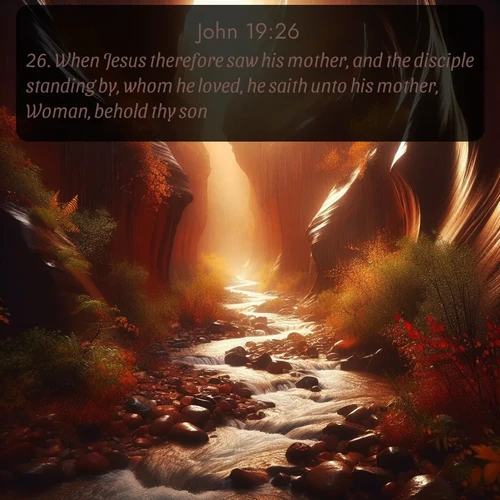Gospel of John 19:26 plusieurs versions / traductions
English Bible Translations
26. When Jesus therefore saw his mother, and the disciple standing by, whom he loved, he saith unto his mother, Woman, behold thy son!
26. When Jesus therefore saw his mother, and the disciple standing by whom he loved, he saith unto his mother, Woman, behold thy son!
26. So when Jesus saw his mother and the disciple who was dear to him, he said to his mother, Mother, there is your son!
26. Jesus therefore, seeing his mother, and the disciple standing by, whom he loved, says to his mother, Woman, behold thy son.
26. When Jesus therefore saw his mother, and the disciple standing by, whom he loved, he saith to his mother, Woman, behold thy son!
26. Jesus, therefore, having seen [his] mother, and the disciple standing by, whom he was loving, he saith to his mother, `Woman, lo, thy son;'
German Bible Translations
26. Da nun Jesus seine Mutter sah und den Jünger dabeistehen, den er liebhatte, spricht er zu seiner Mutter: Weib, siehe, das ist dein Sohn!
26. Als nun Jesus die Mutter sah und den Jünger dabei stehen, den er lieb hatte, spricht er zu seiner Mutter: Weib, siehe, dein Sohn!
French Bible Translations
26. Jésus vit sa mère et, près d'elle, le disciple qu'il aimait. Il dit à sa mère: «Femme, voici ton fils.»
26. Jésus, voyant sa mère, et auprès d’elle le disciple qu’il aimait, dit à sa mère: Femme, voilà ton fils.
26. Jésus, voyant sa mère, et auprès d'elle le disciple qu'il aimait, dit à sa mère: Femme, voilà ton fils.
26. Jésus donc voyant sa mère, et le disciple qu'il aimait se tenant là, dit à sa mère: Femme, voilà ton fils.
26. Et Jésus voyant sa mère, et auprès d'elle le Disciple qu'il aimait, il dit à sa mère : femme, voilà ton Fils.
26. Jésus donc, voyant sa mère et près d'elle le disciple qu'il aimait, dit à sa mère: Femme, voilà ton fils.
Versions with Strong Codes
John 19 / KJV_Strong26. When Jesus[G2424] therefore[G3767] saw[G1492] his mother,[G3384] and[G2532] the[G3588] disciple[G3101] standing by,[G3936] whom[G3739] he loved,[G25] he saith[G3004] unto his[G848] mother,[G3384]
Strong Code definitions
G2424 Iesous/ee-ay-sooce' of Hebrew origin (3091); Jesus (i.e. Jehoshua), the name of our Lord and two (three) other Israelites:--Jesus. see H3091
G3767 oun/oon apparently a primary word; (adverbially) certainly, or (conjunctionally) accordingly:--and (so, truly), but, now (then), so (likewise then), then, therefore, verily, wherefore.
G1492 eido/i'-do a primary verb; used only in certain past tenses, the others being borrowed from the equivalent 3700 and 3708; properly, to see (literally or figuratively); by implication, (in the perfect tense only) to know:--be aware, behold, X can (+ not tell), consider, (have) know(-ledge), look (on), perceive, see, be sure, tell, understand, wish, wot. Compare 3700. see G3700&volume=KJV_strong' target='_self' >G3700 see G3708 see G3700&volume=KJV_strong' target='_self' >G3700
G3384 meter/may'-tare apparently a primary word; a "mother" (literally or figuratively, immediate or remote):--mother.
G2532 kai/kahee apparently, a primary particle, having a copulative and sometimes also a cumulative force; and, also, even, so then, too, etc.; often used in connection (or composition) with other particles or small words:--and, also, both, but, even, for, if, or, so, that, then, therefore, when, yet.
G3588 ho/ho, including the feminine to to in all their inflections; the definite article; the (sometimes to be supplied, at others omitted, in English idiom):--the, this, that, one, he, she, it, etc.
G3101 mathetes/math-ay-tes' from G3129; a learner, i.e. pupil:--disciple. see G3129
G3936 paristemi/par-is'-tay- 3936] (paristemi/par-is'-tay-mee, or prolonged) from G3844 and 2476; to stand beside, i.e. (transitively) to exhibit, proffer, (specially), recommend, (figuratively) substantiate; or (intransitively) to be at hand (or ready), aid:--assist, bring before, command, commend, give presently, present, prove, provide, shew, stand (before, by, here, up, with), yield. see G3844 see G2476
G3739 hos/hos, including feminine ho ho probably a primary word (or perhaps a form of the article 3588); the relatively (sometimes demonstrative) pronoun, who, which, what, that:-one, (an-, the) other, some, that, what, which, who(m, -se), etc. See also 3757. see G3588 see G3757
G25 agapao/ag-ap-ah'-o perhaps from agan (much) (or compare 5689); to love (in a social or moral sense):--(be-)love(-ed). Compare 5368. see G5689 see G5368
G3004 lego/leg'-o a primary verb; properly, to "lay" forth, i.e. (figuratively) relate (in words (usually of systematic or set discourse; whereas G2036 and 5346 generally refer to an individual expression or speech respectively; while 4483 is properly to break silence merely, and 2980 means an extended or random harangue)); by implication, to mean:--ask, bid, boast, call, describe, give out, name, put forth, say(-ing, on), shew, speak, tell, utter. see G2036 see G5346 see G4483 see G2980
G848 hautou/how-too' contracted for G1438; self (in some oblique case or reflexively, relation):-her (own), (of) him(-self), his (own), of it, thee, their (own), them(-selves), they. see G1438
G3384 meter/may'-tare apparently a primary word; a "mother" (literally or figuratively, immediate or remote):--mother.
G1135 gune/goo-nay' probably from the base of G1096; a woman; specially, a wife:--wife, woman. see G1096
G2400 idou/id-oo' second person singular imperative middle voice of G1492; used as imperative lo!; --behold, lo, see. see G1492
G4675 sou/soo genitive case of G4771; of thee, thy:--X home, thee, thine (own), thou, thy. see G4771
G5207 huios/hwee-os' apparently a primary word; a "son" (sometimes of animals), used very widely of immediate, remote or figuratively, kinship:--child, foal, son.
Prédications qui analysent les thèmes Évangile selon Jean 19
Thèmes : Jean 19: La remise en question; La crucifixion; La mort de JésusRelated Sermons discussing Gospel of John 19
Themes : Jean 19: La remise en question; La crucifixion; La mort de Jésussee also: Bible Key Verses ; KJV Bible Images, BBE Bible images

